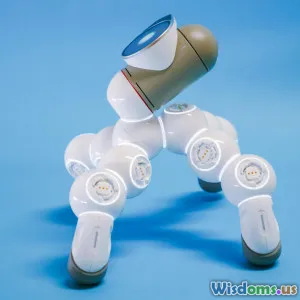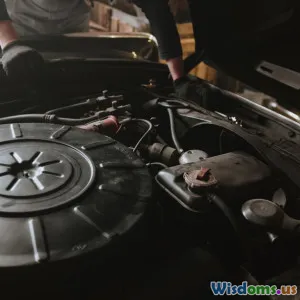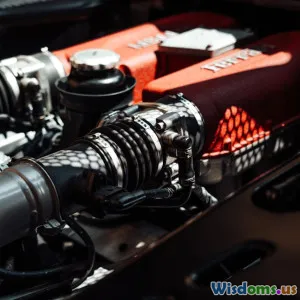
AI Innovations in Automotive Manufacturing
8 min read Explore cutting-edge AI innovations transforming automotive manufacturing, boosting efficiency, quality, and innovation. (0 Reviews)
AI Innovations in Automotive Manufacturing
The automotive industry is undergoing a profound transformation driven by artificial intelligence (AI). From enhancing production efficiency to enabling smarter quality control, AI innovations have become critical in redefining how vehicles are designed, built, and delivered to market. This article delves deep into the most impactful AI developments shaping automotive manufacturing today, illustrating how they are driving cost reductions, accelerating innovation, and paving the way for next-generation mobility.
Introduction: Revolution on the Assembly Line
Imagine an assembly line where intelligent robots predict equipment failures, instantly detecting quality flaws faster than the human eye. Picture AI algorithms optimizing workflows in real time, minimizing waste while adapting to custom design demands. This is no longer just futuristic speculation but the present reality in automotive factories worldwide. AI innovations bring unprecedented agility and precision to a sector traditionally dominated by manual processes and rigid mass production models.
According to a 2023 report from McKinsey, automotive manufacturers deploying AI-driven automation can achieve operational cost reductions of up to 20% and improve production throughput by 15%. Companies like Tesla, BMW, and Volkswagen are aggressively investing in AI capabilities to maintain competitive advantages amid increasing pressures from electrification and autonomous driving technologies.
AI-driven Automation and Robotics
Smarter Robots for Enhanced Precision
Robotic arms have long been staples on automotive lines, but AI elevates their capabilities by integrating real-time perception and decision-making. AI-powered vision systems enable robots to adaptively adjust welding, painting, and assembly tasks based on part variations or environmental changes. For example, FANUC's AI-assisted robotic systems employ deep learning to improve welding accuracy by analyzing subtle vibrations and feedback signals.
Furthermore, collaborative robots—or ‘cobots’—work side by side with human workers, enhancing flexibility. BMW's Leipzig plant uses cobots equipped with AI vision to personalize interior cabins, delivering custom configurations faster without sacrificing quality. This symbiosis results in ergonomic benefits and a 30% faster assembly cycle in certain departments.
Predictive Maintenance and Uptime Maximization
Unplanned downtime can cripple automotive plants. AI transforms maintenance from routine checklists into proactive, predictive interventions. By analyzing sensor data—such as vibration, temperature, and acoustic signals—AI algorithms forecast potential equipment failures days or even weeks in advance. General Motors implemented a predictive maintenance platform reducing downtime by 25% over two years through real-time analysis of hundreds of machines across its factories.
This approach saves millions of dollars annually by scheduling maintenance efficiently, avoiding costly disruptions, and extending machinery lifespan. It also supports just-in-time manufacturing models, critical when shifting rapidly between electric and combustion vehicle production.
Quality Control Transformed by AI
Vision-based Inspection Systems
Quality assurance in vehicle manufacturing is essential to uphold safety and customer satisfaction. Traditional manual inspection is labor-intensive and susceptible to human error. Enter AI-powered vision inspection systems, which use convolutional neural networks (CNNs) to detect paint imperfections, assembly misalignments, and surface defects at microscopic levels.
For instance, Toyota's AI inspection system reviews over 100,000 images daily, identifying defects invisible to inspectors. This has slashed defect rates by nearly 40%, directly improving production yield and reducing waste from rework or recalls.
Real-time Anomaly Detection
Beyond surface inspection, AI models analyze process data like torque measurements, temperature curves, and sensor fluctuations to detect anomalies during production in real-time. This holistic monitoring approach enables immediate adjustments before small issues become systemic. According to a case study at Ford, integrating anomaly detection cut down quality-related downtime by over 15%, enhancing vehicle durability and brand reputation.
AI in Supply Chain and Inventory Management
AI algorithms offer significant improvements in managing the complex, global supply chains of automotive production. By combining historical demand data, geopolitical factors, and logistics conditions, AI-driven systems predict parts shortages and optimize inventory levels with impressive accuracy.
Volkswagen applied AI forecasting tools that reduced excess inventory by 20% and decreased supplier lead times by 10%, resulting in cost savings exceeding $50 million annually. Additionally, smart logistics powered by AI-enabled autonomous forklifts and trucks streamline warehousing tasks, ensuring parts are delivered just as they are needed on the assembly line.
Innovation Acceleration and Customization
AI-Designed Components
Generative design powered by AI enables engineers to create lightweight, strong components optimized for electric vehicles. For example, General Motors' investment in AI-driven design projects yielded aluminum structures 40% lighter while maintaining crash safety standards. These innovations reduce battery load and thus extend vehicle range.
Personalized Manufacturing
Consumers increasingly demand personalization in vehicle models. AI facilitates mass customization without sacrificing economies of scale. Cadillac's AI-enabled assembly lines configure vehicles based on customer preferences in real-time, resulting in unique features fitted during production rather than post-assembly customization.
Challenges and Ethical Considerations
Despite promising advances, implementing AI in automotive manufacturing poses challenges such as data privacy, the security of connected AI systems, and the risk of workforce displacement. Successful integration requires retraining workers and transparent governance to ensure AI augments human roles rather than replacing them.
Conclusion: Driving the Future of Automotive Manufacturing
AI innovations are no longer auxiliary tools but the backbone of modern automotive manufacturing techniques. From enhancing robotic precision to predictive maintenance and supply chain optimization, AI unlocks value by accelerating efficiency, improving quality, and enabling unprecedented flexibility.
As the automotive landscape shifts towards electric and autonomous vehicles, manufacturers embracing AI-driven paradigms will lead the next wave of industry innovation. The factories of tomorrow are intelligent ecosystems where humans and machines collaborate seamlessly to craft vehicles designed for a smarter, more sustainable future.
References:
- McKinsey & Company. (2023). AI in Automotive: The Road Ahead.
- General Motors Annual Report, 2023.
- Toyota Motor Corporation, AI-based Quality Assurance.
- Volkswagen Group Supply Chain Optimization Press Release, 2023.
- FANUC Robotics: AI Welding Technologies.
Written by: Automotive Tech Analyst, AI Thought Leader
Rate the Post
User Reviews
Popular Posts





















